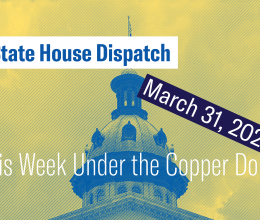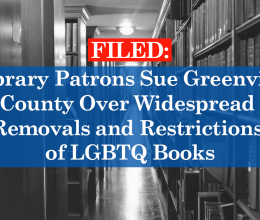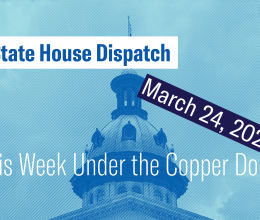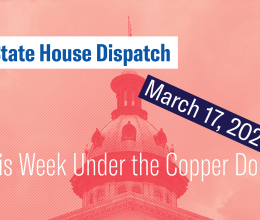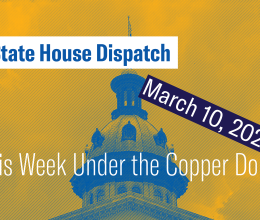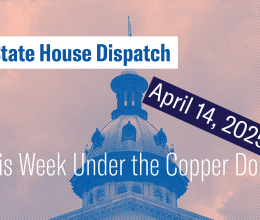
This weekend we saw massive protests in communities across South Carolina. It’s always exciting to see new people and longtime activists out in the streets. But what happens next?
If you are new to advocacy and want to learn how to make a difference in state-level policymaking, consider signing up for our free virtual training on Wednesday, April 9, from 7-8 p.m.
Five weeks remain until the first half of the 2025-2026 legislative session ends on May 9. Any bills that do not pass by then will carry over to January 2026. Here’s what we’re watching.
How to keep resisting attacks on Diversity Equity & Inclusion
South Carolinians have been showing up and speaking out since March 4 against House Bill 3927, a sweeping and ideologically motivated speech ban that would punish state agencies, schools, and universities for pursuing Diversity, Equity, and Inclusion initiatives. To date, no member of the public has spoken in favor of this bill in a legislative hearing.
On Wednesday, sponsors of this bill jammed it through by limiting debate on proposed amendments, which mostly came from members of the South Carolina Legislative Black Caucus. Among other things, these amendments would have protected the constitutional rights of South Carolinians and state contractors, promoted equal access to STEM (Science, Technology, Engineering, and Math) programs in schools, and allowed medical professionals to continue DEI training to combat inequities and biases in the provision of healthcare.
The majority of lawmakers shot those amendments down and instead adopted a dramatic revision of the bill that targets state contractors for DEI practices. The bill passed out of the House on Thursday. The bill is now in the hands of the Senate, where it has not yet been assigned to a committee.
As our Advocacy Director Josh Malkin emphasized in a recent video update on Instagram, this bill isn't a done deal. We can still push back by calling and writing to our state senators. If you need help finding your state senator and getting started with a message, we have an email writing page here:
A fresh start on book ban regulations?
Last week, South Carolina found itself on the brink of national infamy. The State Board of Education was considering banning 10 books from all K-12 schools, which would have brought the total number of books restricted or removed to 22 — the highest number of any state in the U.S.
Until last week, the board had been routinely voting to ban books because of Regulation 43-170, a rule pushed by Education Superintendent Ellen Weaver that the State Legislature failed to review in time before it passed automatically into public policy in 2024. This policy purports to be about “age and developmentally appropriate” classroom materials, but it sets the same standard for kindergartners and 18-year-old high school seniors: Any text containing a “description” of sexual conduct is banned from classroom collections and school libraries.
On April 1, the State Board of Education pumped the brakes on book bans and even suggested they would be willing to revisit Regulation 43-170. To quote board member Maya Slaughter, “I am concerned about potential abuses of a process that we intended to be fair and equitable."
State board members and their contact information are available on the S.C. Department of Education website. Please consider writing to thank them for their willingness to revise this harmful policy.
To quote the writer and long-time educator Steve Nuzum on the April 1 board meeting, “There seemed to be a shift in the South Carolina Board of Education today.” It’s a much-needed shift, and we’ll have to keep up public pressure to defend the Freedom to Read.
New bills attacking the rights of transgender South Carolinians
With five weeks of lawmaking left in 2025 — and some of that time taken up by budget debates — lawmakers are running out of time to push bills through the committee process and pass them in this calendar year. Still, some recently filed bills give us a grim preview of what some lawmakers will likely prioritize in 2026.
Several bills filed this spring have targeted the rights of transgender people, particularly trans youth. Senate Bill 540 seems designed to protect harmful “conversion therapy” practices that falsely claim to change a person’s gender identity. The bill, filed April 3, states that a parent or guardian who “seeks out and consents to any lawful mental healthcare service for a child to assist the child in living consistent with the child's sex” cannot be charged with abuse or harm. This bill would send South Carolina in the opposite direction of the 20 states that have passed laws protecting youth from this harmful practice.
House Bill 4302, also filed on April 3, would require that children in residential foster care facilities be placed in housing units “based strictly upon the individual's anatomical sex at birth as recognized on their original birth certificate.”
In a state where politicians claim to love limited government, our lawmakers keep advancing bills that would create a state-enforced definition of gender — a definition that is notably out of step with science.
The ACLU of South Carolina is currently challenging one of the more egregious laws passed in 2024, a prohibition on medical professionals providing gender-affirming care to transgender youth as well as many trans adults. You can read more about that on the case page for Misanin v. Wilson.
We’ll keep fighting in court. But we also need to keep showing up in the State House whenever civil liberties are threatened. Neither of these recent harmful bills has been scheduled for a committee hearing yet. We’ll let you know if and when that happens.

